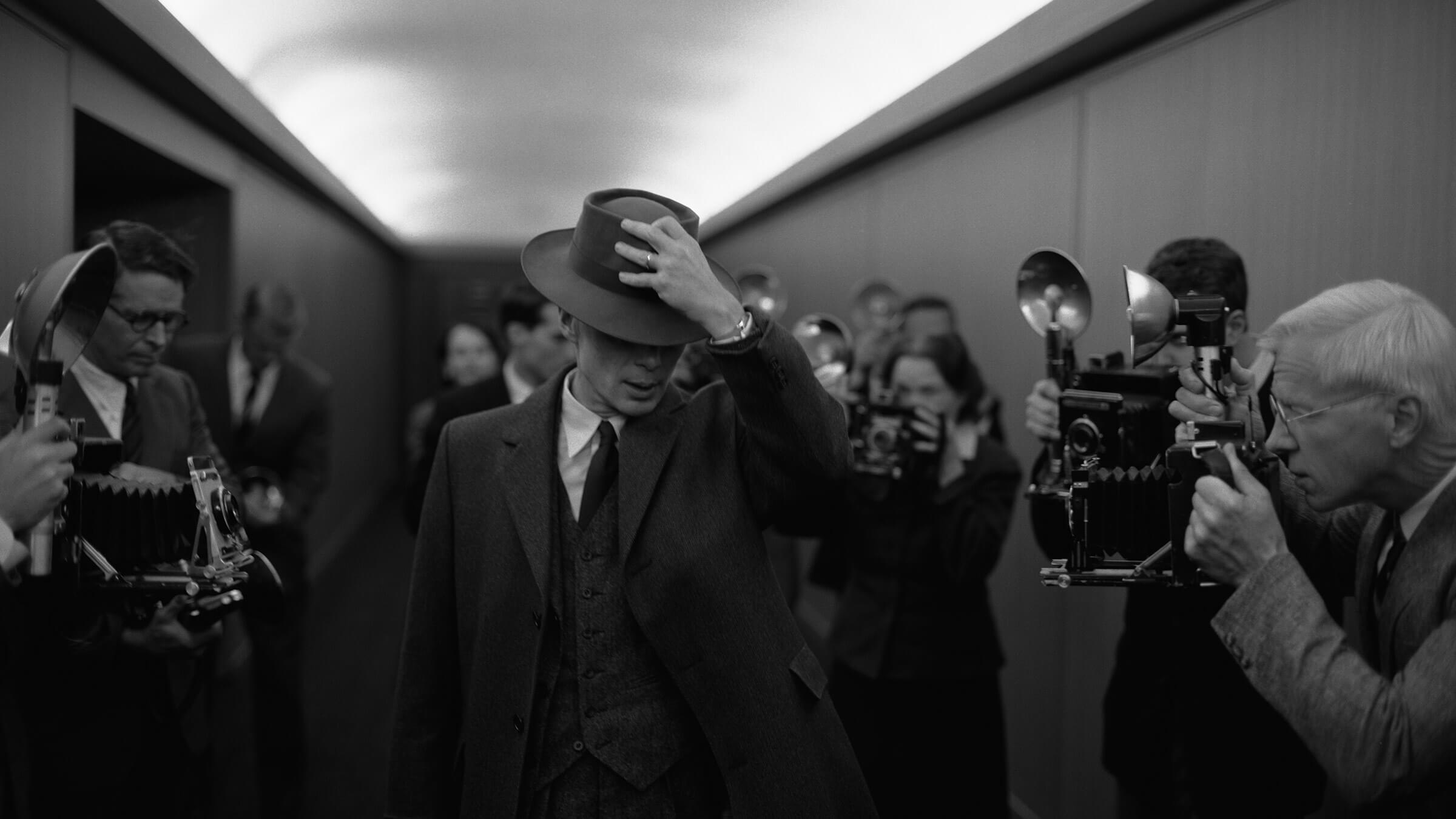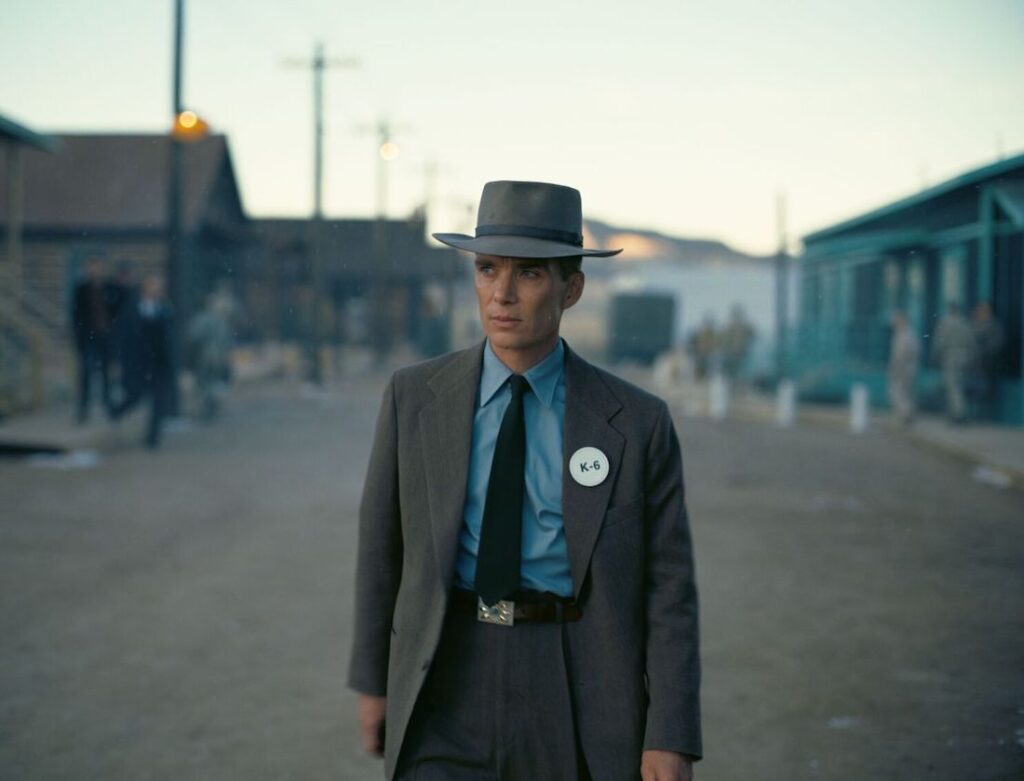By Kole Lyndon Lee · July 26, 2023

Did you know that Christopher Nolan took a daring and unconventional approach while crafting the screenplay for his new film Oppenheimer?
He consciously broke traditional screenwriting rules by skillfully penning the script in the first-person, something that had a unique and positive effect on the story. Let’s explore the significance of this creative decision and how it added a unique layer of depth and emotional engagement to the story.
Before we dig in, though, watch this episode of Entertainment Weekly’s Around the Table with Christopher Nolan, along with Oppenheimer cast members Cillian Murphy, Emily Blunt, Matt Damon, and Robert Downey Jr., in which the director shares his thoughts on his unusual screenwriting choice (as well as a lot of other nutritious filmmaking advice).
Christopher Nolan provided valuable insight into his decision to embrace the first-person perspective. He believed that such a narrative style could immerse readers in the world and psyche of J. Robert Oppenheimer, the film’s central character. By adopting this intimate approach, Nolan masterfully allowed readers to experience the story through Oppenheimer’s eyes, making them active participants in his emotional journey.
In an interview with Empire magazine, he detailed the reason behind this creative choice.
“I actually wrote in the first-person, which I’ve never done before. I don’t know if anyone’s ever done it before. But the point of it is, with the color sequences, which is the bulk of the film, everything is told from Oppenheimer’s point of view–you’re literally kind of looking through his eyes.
There’s the idea of how we get in somebody’s head and see how they were visualizing this radical reinvention of physics. One of the things that cinema has struggled with historically is the representation of intelligence or genius. It very often fails to engage people.”

Cillian Murphy and Christopher Nolan on the set of ‘Oppenheimer’
In the Entertainment Weekly interview, Matt Damon shared his experience with reading the unusual script.
“I was so blown away by the script. Again, Robert said, it’s in the first person, which I’ve never seen before. So rather than say, ‘Oppenheimer crosses the room.’ It says, ‘I walk across the room.’ In the present tense. It has that visceral effect on you and pulls you right in. Which is the point. He’s trying to tell his readers this is the feeling of the movie. It has to go through the subjective lens of this character, and it entirely rests on that.”
Read More: How to Succeed the Christopher Nolan Way
Nolan’s brilliance lay in recognizing that cinema often struggles to effectively portray intelligence or genius in its true essence, as quoted above. To overcome this challenge, he wove an emotional and psychological catharsis into the script alone, just black ink on the white page. By employing the first-person perspective, readers are not just observers; they become intimately connected with Oppenheimer’s innermost thoughts, motivations, and emotional turmoil.

Cillian Murphy in ‘Oppenheimer’
The first-person perspective granted readers unique access to Oppenheimer’s mind, enabling them to understand the repercussions of his choices leading up to one of the most pivotal moments in human history—the Trinity Test. Readers become invested in the consequences of Oppenheimer’s decisions, allowing them to emotionally experience the profound impact of his actions.
While adhering to screenwriting “rules” can provide valuable guidance, Nolan’s innovative approach to “Oppenheimer” showcases the power of thinking outside the box. The narrative perspective offers readers an unforgettable and immersive experience that surpasses the limitations of the written word. Nolan’s ability to engage the audience on an emotional level from the very beginning of the screenplay elevates the story to an extraordinary level.

Cillian Murphy in ‘Oppenheimer’
Nolan’s approach serves as a beacon of inspiration for aspiring screenwriters. It demonstrates that breaking rules with deliberate and purposeful intent can infuse a screenplay with unparalleled authenticity and emotional resonance. By giving readers and actors an unforgettable experience through a unique narrative style, Nolan not only captured their attention but also set the stage for a cinematic masterpiece.
Read More: How Christopher Nolan Develops Movie Concepts
In the heart of this daring narrative experiment lies the ultimate rule of screenwriting—to create a compelling and captivating story. Nolan’s decision to adopt the first-person perspective beautifully emphasizes the power of storytelling. He showcases that, above all, a screenplay’s ability to connect with readers and evoke deep emotion remains the hallmark of a great script.
Christopher Nolan’s bold choice to pen “Oppenheimer” in the first person serves as a testament to his exceptional storytelling prowess. By skillfully breaking traditional rules and crafting a narrative that immerses readers in the protagonist’s psyche, Nolan creates a script that transcends conventional norms.
As you embark on your own screenwriting journey, remember to prioritize the art of storytelling and consider bold narrative choices that enhance your script’s impact. In the end, the true power of a remarkable screenplay lies in its ability to resonate with readers and move audiences when brought to life on the grand cinematic canvas.